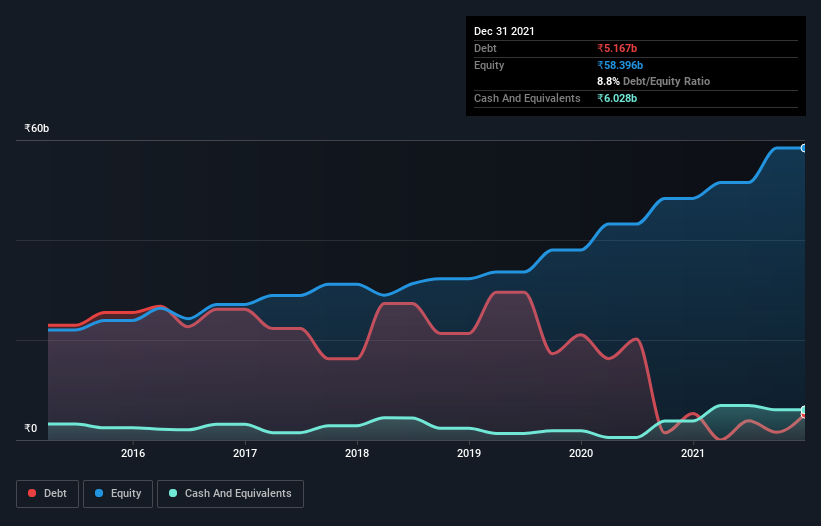Here's Why Coromandel International (NSE:COROMANDEL) Can Manage Its Debt Responsibly

The external fund manager backed by Berkshire Hathaway's Charlie Munger, Li Lu, makes no bones about it when he says 'The biggest investment risk is not the volatility of prices, but whether you will suffer a permanent loss of capital.' So it might be obvious that you need to consider debt, when you think about how risky any given stock is, because too much debt can sink a company. We note that Coromandel International Limited (NSE:COROMANDEL) does have debt on its balance sheet. But should shareholders be worried about its use of debt?
When Is Debt Dangerous?
Debt assists a business until the business has trouble paying it off, either with new capital or with free cash flow. Part and parcel of capitalism is the process of 'creative destruction' where failed businesses are mercilessly liquidated by their bankers. However, a more frequent (but still costly) occurrence is where a company must issue shares at bargain-basement prices, permanently diluting shareholders, just to shore up its balance sheet. Of course, the upside of debt is that it often represents cheap capital, especially when it replaces dilution in a company with the ability to reinvest at high rates of return. The first step when considering a company's debt levels is to consider its cash and debt together.
See our latest analysis for Coromandel International
How Much Debt Does Coromandel International Carry?
The chart below, which you can click on for greater detail, shows that Coromandel International had ₹5.17b in debt in September 2021; about the same as the year before. However, it does have ₹6.03b in cash offsetting this, leading to net cash of ₹861.2m.

How Strong Is Coromandel International's Balance Sheet?
According to the last reported balance sheet, Coromandel International had liabilities of ₹49.0b due within 12 months, and liabilities of ₹4.25b due beyond 12 months. Offsetting these obligations, it had cash of ₹6.03b as well as receivables valued at ₹32.5b due within 12 months. So its liabilities outweigh the sum of its cash and (near-term) receivables by ₹14.7b.
Since publicly traded Coromandel International shares are worth a total of ₹215.4b, it seems unlikely that this level of liabilities would be a major threat. However, we do think it is worth keeping an eye on its balance sheet strength, as it may change over time. Despite its noteworthy liabilities, Coromandel International boasts net cash, so it's fair to say it does not have a heavy debt load!
On the other hand, Coromandel International saw its EBIT drop by 9.0% in the last twelve months. If earnings continue to decline at that rate the company may have increasing difficulty managing its debt load. There's no doubt that we learn most about debt from the balance sheet. But ultimately the future profitability of the business will decide if Coromandel International can strengthen its balance sheet over time. So if you're focused on the future you can check out this free report showing analyst profit forecasts.
Finally, a company can only pay off debt with cold hard cash, not accounting profits. While Coromandel International has net cash on its balance sheet, it's still worth taking a look at its ability to convert earnings before interest and tax (EBIT) to free cash flow, to help us understand how quickly it is building (or eroding) that cash balance. Over the last three years, Coromandel International actually produced more free cash flow than EBIT. That sort of strong cash conversion gets us as excited as the crowd when the beat drops at a Daft Punk concert.
Summing up
While it is always sensible to look at a company's total liabilities, it is very reassuring that Coromandel International has ₹861.2m in net cash. The cherry on top was that in converted 112% of that EBIT to free cash flow, bringing in ₹20b. So is Coromandel International's debt a risk? It doesn't seem so to us. There's no doubt that we learn most about debt from the balance sheet. But ultimately, every company can contain risks that exist outside of the balance sheet. We've identified 1 warning sign with Coromandel International , and understanding them should be part of your investment process.
At the end of the day, it's often better to focus on companies that are free from net debt. You can access our special list of such companies (all with a track record of profit growth). It's free.
New: AI Stock Screener & Alerts
Our new AI Stock Screener scans the market every day to uncover opportunities.
• Dividend Powerhouses (3%+ Yield)
• Undervalued Small Caps with Insider Buying
• High growth Tech and AI Companies
Or build your own from over 50 metrics.
Have feedback on this article? Concerned about the content? Get in touch with us directly. Alternatively, email editorial-team (at) simplywallst.com.
This article by Simply Wall St is general in nature. We provide commentary based on historical data and analyst forecasts only using an unbiased methodology and our articles are not intended to be financial advice. It does not constitute a recommendation to buy or sell any stock, and does not take account of your objectives, or your financial situation. We aim to bring you long-term focused analysis driven by fundamental data. Note that our analysis may not factor in the latest price-sensitive company announcements or qualitative material. Simply Wall St has no position in any stocks mentioned.
About NSEI:COROMANDEL
Coromandel International
Provides agriculture solutions in India and internationally.
Flawless balance sheet average dividend payer.

